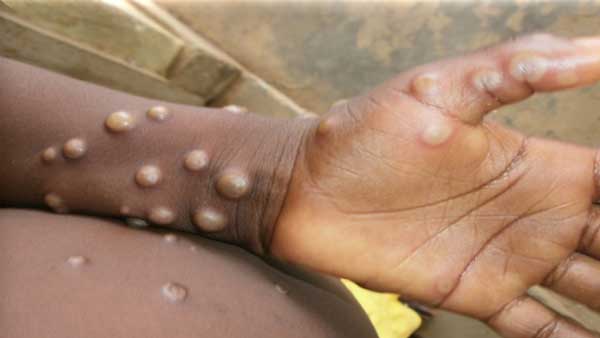
Monkeypox cases rapidly spreading through "possible sexual transmission"
Washington, May 21: As more cases of monkeypox are detected in Europe and North America, some scientists who have monitored numerous outbreaks in Africa say they are baffled by the unusual disease's spread in developed countries.
Recommended Video
Cases of the smallpox-related disease haven't previously been seen among people with no links to central and West Africa. But in the past week, Britain, Spain, Portugal, Italy, US, Sweden and Canada all reported infections, mostly in young men who hadn't previously travelled to Africa.

France, Germany, Belgium and Australia confirmed their first cases of monkeypox on Friday.
Monkeypox typically causes fever, chills, a rash and lesions on the face or genitals. WHO estimates the disease is fatal for about one in 10 people, but smallpox vaccines are protective and some antiviral drugs are also being developed.
One of the theories British health officials are exploring is whether the disease is being sexually transmitted. Health officials have asked doctors and nurses to be on alert for potential cases, but said the risk to the general population is low.
The World Health Organisation's lead on emergency response, Dr. Ibrahima Soce Fall, acknowledged this week that there were still "so many unknowns in terms of the dynamics of transmission, the clinical features (and) the epidemiology."
On Friday, Britain's Health Security Agency reported 11 new monkeypox cases, saying that "a notable proportion" of the most recent infections in the U.K. and Europe have been in young men with no history of travel to Africa who were gay, bisexual, or had sex with men.
Authorities in Spain and Portugal also said their cases were in young men who mostly had sex with other men and said those cases were picked up when the men turned up with lesions at sexual health clinics.
Experts have stressed they do not know if the disease is being spread through sex, or other close contact related to sex.
"This is not something we've seen in Nigeria," virologist Tomori said. He said viruses that hadn't initially been known to transmit via sex, like Ebola, were later proven to do so after bigger epidemics showed different patterns of spread.
The same could be true of monkeypox, Tomori said. "We would have to go back through our records to see if this might have happened, like between a husband and wife," he said.
In Germany, Health Minister Karl Lauterbach said the government was confident the outbreak could be contained. He said the virus was being sequenced to see if there were any genetic changes that might have made it more infectious.
Rolf Gustafson, an infectious diseases professor, told Swedish broadcaster SVT that it was "very difficult" to imagine the situation might worsen.
"We will certainly find some further cases in Sweden, but I do not think there will be an epidemic in any way. There is nothing to suggest that at present."
Scientists said that while it's possible the outbreak's first patient caught the disease while in Africa, what's happening now is exceptional.
"We've never seen anything like what's happening in Europe," Christian Happi, director of the African Centre of Excellence for Genomics of Infectious Diseases, said. "We haven't seen anything to say that the transmission patterns of monkeypox have been changing in Africa, so if something different is happening in Europe, then Europe needs to investigate that."
Happi also pointed out that the suspension of smallpox vaccination campaigns after the disease was eradicated in 1980 might inadvertently be helping monkeypox spread. Smallpox vaccines also protect against monkeypox, but mass immunisation was stopped decades ago.
"Aside from people in west and Central Africa who may have some immunity to monkeypox from past exposure, not having any smallpox vaccination means nobody has any kind of immunity to monkeypox," Happi said.
Shabir Mahdi, a professor of vaccinology at the University of Witwatersrand in Johannesburg, said a detailed investigation of the outbreak in Europe, including determining who the first patients were, was now critical.
"We
need
to
really
understand
how
this
first
started
and
why
the
virus
is
now
gaining
traction,"
he
said.
"In
Africa,
there
have
been
very
controlled
and
infrequent
outbreaks
of
monkeypox.
If
that's
now
changing,
we
really
need
to
understand
why."


 Click it and Unblock the Notifications
Click it and Unblock the Notifications



























